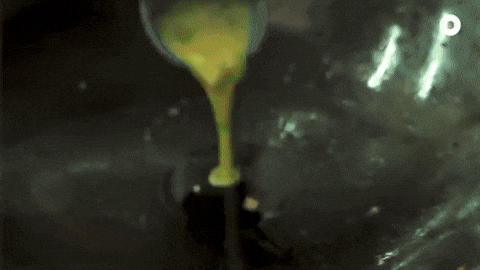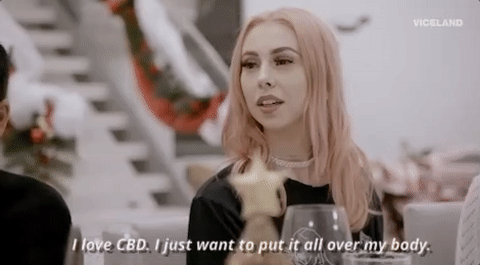
My name is Savannah. I'm 25 years old, and I have abandonment issues.
The time it took for me to be able to accept such a fact about myself is almost as long as my existence—although I must say that I discovered at a young age that abrupt separation, no matter who it involves or what the circumstances are, is an extremely painful emotional trigger for me.
It has never been clear as to why that's the case, though. I have yet to pinpoint the reason it always feels like a part of my soul gets ripped away from my body every time someone walks out of my life. Or, like I confessed in the past, why it's so difficult to peacefully let people go without ultimately questioning my worth and the importance of my own existence. This is partially why I felt compelled to grab my pen and write on the matter of abandonment issues. To me, rare are the issues that writing—and of course, researching—can't solve.
To help me get a grip on this fear, I interviewed Shanta Jackson, AKA The Homegirl Therapist, a Black licensed therapist and advocate for mental health awareness, therapy, and healing. "Abandonment issues can be complex," explains Shanta. "They can come from the loss of a loved one or the loss of a relationship or marriage. There is also emotional abandonment that a lot of my clients have experienced, which is where a parent or caregiver is not emotionally present or available to you."
Shanta's last words resonate in my mind because of how familiar they are. They brought back to mind what one of my girlfriends told me earlier this year. We were discussing the subject and she was trying to convince me that my father's behavior toward me as a child is at the heart of my abandonment issues. It sounded illogical to me. My father never did or say anything that made me feel unwanted, and I can't recall a time in my life where I had reasons to complain about his attitude toward me. Even if he wasn't as present as my mother was and I never really got to spend a lot of time with him because of his job, I never once doubted how much he loved or cared for me. Neither did I feel like he was missing in my life.
But my friend insisted and promised me that if I read Heal Your Wounds and Find Your True Self—a book that explores with depth the five wounds of the soul: rejection, abandonment, betrayal, injustice, and humiliation—I would have a better understanding of my emotions.
In the book, Lise Bourbeau writes that indeed, the wound of abandonment is awakened in a child between ages of one and three by the parent of the opposite sex as a result of lack of parental support and emotional attention. While as a writer, I know that facts written in books are not a synonym for truth and I could've chosen to trust only my memory, somehow Bourbeau's case study still incited me to dig a little deeper into my feelings of abandonment. And surprisingly, I think I may have found something. It took me a minute to see things in this way but after all, maybe my father is responsible for my abandonment issues.

Perhaps my fear of being abandoned was sparked by my father's refusal to educate me on our ethnic background—our North African roots—simply because he didn't care.
I asked Shanta about my theory. "Absolutely!" she said. I could easily imagine our Homegirl Therapist nodding as I read her reaction to this thought. "It's possible that this is where your abandonment issues stem from. You feel abandoned in a sense that you don't know that side of you—because of his lack of interest in his own ethnicity and teaching you as well. So, you feel lost as it relates to you knowing who you are, which fuels the abandonment issues."
I went back to Bourbeau's book, scanning from one random page to another, and I came across a passage that led to another defining a-ha moment. It was a revelation that not only made sense immediately but also opened up the path for me to finally reach a place of peace regarding my fear of abandonment. It is said that our souls come on this earth carrying at least one of the five wounds mentioned earlier. Depending on which they suffer from, the right lives will be assigned to them.
By the right lives, I mean human experiences that will expose our souls to situations that will awaken and trigger the wounds with the intent to heal them. Where it gets tricky is that a soul may not have enough of one human experience to heal. Therefore, it carries its wounds to the next life, and the next life, and the next life until they are taken care of properly, with love and acceptance.
Now, you're probably wondering, what does it mean to take care of your abandonment issues with love and acceptance? How do I do that? Well, this is something I also discussed with our Homegirl Therapist. Here's what she said:
"Abandonment can't necessarily be worked out in a series of at-home exercises. To truly uproot the start of that abandonment, it is suggested that you attend counseling. Without discovering the root and working through that, it is difficult to manage the symptoms of abandonment issues, and that is where the problems happen for a lot of people. The latter as well as all of the symptoms can really be combined into…self-sabotage. We sabotage relationships because of our fear of being abandoned."
Shanta then broke down the process of coming to terms with your abandonment issues into three steps:
1. Identify Your Triggers
 Giphy
GiphyIdentifying your triggers is important in the process of healing your abandonment issues. Knowing what triggers your unhealthy behaviors allows you to identify the emotions that come, and intervene on these behaviors before falling victim to self-sabotage.
How can you identify your triggers?
- When you start to experience intense emotions, pause for a second, take a deep breath and take inventory of what just happened. Ask yourself why you feel the way you do at that moment.
Example: Your partner decides to go out and hang with a group of friends for the night. You begin to feel anxious and upset. What bothers you the most about your partner hanging with friends? Is it the friends they're hanging with? Do you not want to be alone tonight? Do you have a fear that they will be out late and won't answer your calls? When was the last time you felt this way?
2. Identify Self-Sabotaging Patterns
 Giphy
GiphyYou must identify what your self-sabotaging patterns are and the exact symptoms of your trauma. This will allow you to become more self-aware, and gain the ability to catch emotions at the onset. Note that it will require complete honesty on your part.
How can you identify your self-sabotaging patterns?
- When you find yourself triggered, what has been your "default setting"? What behaviors do you engage in the most? Do you find yourself feeling the need to withdraw or hold back, to attack, or become defensive? Do you turn into yourself and shame yourself for feeling upset? Do you blame yourself or external factors for the perceived issues?
- When you feel insecure, ask yourself, "How do I usually behave? How do I protect myself? If I evaluate my past and current relationships, have there been patterns in my exes' or entourage's complaints?" Examples can be never sharing your emotions, shutting down during conflict, seeking attention through conflict, or becoming clingy or needy.
3. Break The Cycle
 Giphy
GiphyWhile identifying triggers and self-sabotaging patterns are important steps, they can only take you so far if you don't heal yourself. When dealing with abandonment issues, it's likely that in our brokenness, we expect our partner or the person who awakened the fear to fix it. The truth is, they can't. The secret here is self-work.
How can you break self-sabotaging the cycle?
- Talk about it: Communication can truly aid in preventing some unnecessary anxiety or fears with those we maintain any kind of relationship with. Oftentimes, we create narratives in our minds that are likely untrue and then allow those thoughts to drive unhealthy behaviors. When triggered by certain situations, express calmly how you feel, using "I" statements, so that you can take ownership of those feelings and not display blame.
- Be present: One of the other things that we tend to do when we have fear of abandonment is that we focus so much on the past where the trauma happened and the future of what could happen versus being mindful and present in a relationship. Your relationship is happening right now, so put less focus on what might happen and more focus on what is happening.
- Seek therapy: I can't stress enough how important therapy will be to your overall healing, especially when it comes to abandonment issues. Abandonment is tricky and it is important that you seek the help of a mental health professional to process and work through the traumas.
Personally, this is a journey inward that I've taken on for nearly a year now. If you asked me what it looks like for me and what it has taught me, I would say that chasing emotionally unavailable men is how I self-sabotage.
I figured out that by mothering my inner child spiritually and physically by speaking life into her, respecting her boundaries, avoiding putting her in situations that could result in heartbreaks, patting her on the back when she needs a little support, holding her hand at night when she needs to feel loved, pampering her when she doesn't like the reflection she sees in the mirror—doing all of this instead of navigating life from a place of loss and void is how I engage in healthy behaviors. I'm still a work in progress, though.
Moreover, I'm learning that the end of a relationship doesn't have to feel like the world is ending. Some people aren't meant to stay in our lives forever—that's OK. If it's tempting to fight and beg for them to stay, sometimes the best we can do is just to cling to the good memories that we share and understand that those we love are free to continue walking their own path on their own terms.
Their decision to part ways with us doesn't mean that we aren't worthy of love. Quite the contrary, I like to think that it means that a better love is coming.
Are you a member of our insiders' squad? Join us in the xoTribe Members Community today!
Featured image by Shutterstock
- Relational Anxious Attachment Style: What Is It? - xoNecole ... ›
- Are You In Love Or Are You In Need? - xoNecole: Women's Interest ... ›
- 5 Signs Your Insecurities Are Killing Your Relationship - xoNecole ... ›
- 5 Signs Of Emotionally Unavailable Men - xoNecole: Women's Interest, Love, Wellness, Beauty ›
Your December 2025 Monthly Horoscopes Are All About Surrender & Alignment
December is about letting go. We end the year with the need for more peace, reflection, and rejuvenation, and that is exactly what December is providing for us. The Sun is in Sagittarius, and anything is possible. This is the month to believe in that and to know that the universe is supporting you. With a Supermoon in Gemini as we begin the month as well, we have an opportunity to gain the closure we have been looking for this year and to wrap up old projects, ideas, and communication breakthroughs.
This is the month to make your peace the priority and let go of trying to control the way the tides are turning. Trust in your new beginning, and give yourself time to prepare for it this month.
A big part of the clarity that is coming through this month is due to Neptune going direct in Pisces on December 10, after being retrograde here since July. With Neptune now direct, we are able to see our inspiration and creativity a little more clearly, providing the perfect energy for dreams and manifestation to be built upon. The smoke is clearing, and it’s up to you to decide what you want to do with this newfound clarity that this transit is bringing. Mercury also moves back into Sagittarius on December 11, which is great for communication and clarity, and the adventures you were trying to see through at the beginning of November come around for you again with greater purpose and support.
On December 15, Mars enters Capricorn until the end of January 2026, and this is the extra push we need to make important changes and to be on the path towards greater abundance, stability, and prosperity. Mars in Capricorn takes care of business, and we have extra energy at our disposal during this time to do so. This transit is an ideal time to focus on your career or financial goals for next year and to start putting some of these plans into motion now. A few days later, we have the New Moon of the month, which will be in Sagittarius on December 19, and this is the perfect New Moon to manifest.
The energy is high, magic is in the air, and it’s all about moving forward with the new beginnings that are inspiring you and bringing you joy to think about right now.
Capricorn Season officially begins on December 21, and this earth sign energy is how we heal, gain closure, and build new foundations in our world. With Venus also moving into a Capricorn a few days later, there is something about peace, prosperity, and security that we are gaining in life and in love as we close out the year, and this is what we need right now. This month is about reflecting on what was, letting go of old hurt, and renewing. December is an ending and a new beginning in one, and there is magic in this space to be created.
Read for your sun and rising sign below to see what December 2025 has in store for you.
 AriesKyra Jay for xoNecole
AriesKyra Jay for xoNecoleARIES
December is a full-circle moment for you, Aries. You are seeing the gifts in your world and have a lot of gratitude for the way things have come about for you as of late. There are culminations in your world that are providing you with more abundance, stability, and community, and you are exactly where you are meant to be this month. With the Sun in a fellow fire sign and in your 9th house of travel for most of the month, December is a good time to get out of your comfort zone, explore the world around you, and get your body moving.
Mars, your ruling planet, also makes a change and moves into Capricorn on December 15, which will fuel your inspiration and power in your career space. You are making a lot of professional progress as we close out the year; however, make sure to be more mindful of your competitive drive right now. The New Moon on December 19 is the perfect opportunity for you to create some new plans and goals when it comes to traveling, education, and where you want to gain some new inspiration in your world. Overall, this is a month of things coming together for you serendipitously.
 TaurusKyra Jay for xoNecole
TaurusKyra Jay for xoNecoleTAURUS
December is about trusting your intuition, Taurus. You have a lot on your mind this month, and it’s best to delegate, communicate, and allow yourself some relief by opening up to someone and not feeling like you have to hold everything in. As we begin the month, we have a Supermoon in Gemini happening in your house of income, and the plans and projects you have been building here come to fruition for you now. This is the time to gain clarity on your financial world and to take a look at what spending habits you want to let go of here as well.
With Venus in your 8th house of shared resources for most of the month, you are doing a cleanse on your commitments, partnerships, and business ventures. You are taking a look at what you want to dedicate yourself to in the future, and what commitments you may need to let go of now in order to be in the space you truly want to be, both financially and within some of your relationship dynamics. Before we end the month, we have a New Moon in this same area of your chart, and it’s time to look at the opportunities that are presenting themselves and to trust your internal guidance system to lead you forward.
 GeminiKyra Jay for xoNecole
GeminiKyra Jay for xoNecoleGEMINI
You are moving forward fearlessly this month, Gemini. December is your month of love, passion, and dignity, and you are owning the light that you shine. We begin the month with the last Supermoon of the year, happening in your sign, and you are stepping up to the plate. You are showing up, owning how much you have grown this year, and allowing yourself to heal while also acknowledging that you have done your best and you deserve to have fun in the midst of the changes you are creating.
Mercury, your ruling planet, is officially out of retrograde, and you can use this energy to the fullest potential now. With Mercury in your 7th house of love, it’s time to speak from the heart and to talk about the things that matter and that are inspiring you right now to your loved ones. You never know what kind of epiphanies you may have when you open up the conversation to others. Before the month ends, you have a New Moon in this same love area of your chart, and this New Moon is all about manifesting romance, commitment, and abundance in your world.
 CancerKyra Jay for xoNecole
CancerKyra Jay for xoNecoleCANCER
December is an opening for more love, more joy, and more freedom in your life, Cancer. You have come to a place where you hold so much gratitude in your heart for where you are today and where your heart is shining, and things come together for you with more ease right now. With the Sun in your 6th house of health, work, and daily routines for most of the month, you are getting your ducks in a row while also putting more energy and effort into taking care of yourself, your priorities, and your well-being. This month surprises you in many ways, and it’s because you are showing up.
Mars and Venus both move into your house of love, relationships, marriage, and abundance this month, and you are making strides in your love life. You have both of these opposing forces on your side and are being recognized for the love you are while also receiving the love you want. This month, overall, is about focusing more on the positives in your world and letting your heart have its joy. Before December comes to an end, there is a New Moon in Sagittarius, and this is the perfect opportunity to create the plans you want to see through next year, especially when it comes to your work life, colleagues, business ventures, and health.
 LeoKyra Jay for xoNecole
LeoKyra Jay for xoNecoleLEO
The scales of karma are balancing, and they are balancing in your favor this month, Leo. December is your month of truth, and of seeing it clearly in your world. The Sun is in your house of romance, pleasure, and happiness for most of the month, and it’s time to relax, be in the present moment, and allow what is meant to be, to be. With a Supermoon in your 11th house of manifestation as December begins, this is a powerful month for seeing your dreams come to fruition, and for feeling like the intentions you have set this year are finally here for you now.
Mars also moves into your 6th house mid-month, and this is the perfect energy to have to move into the new year. You have extra energy at your disposal right now and are feeling fearless with what is possible for you and your daily routine. Before the month ends, we also have a New Moon in a fellow fire sign, Sagittarius, and this is a breakthrough moment for you and your heart. December, overall, wants to show you how loved and supported you are and will be doing so in magical, unexpected, and concrete ways.
 VirgoKyra Jay for xoNecole
VirgoKyra Jay for xoNecoleVIRGO
December is a month of victory, Virgo. You are showing up and experiencing some new successes in your world that move you forward on your path in life. With a Supermoon in your 10th house of career as we begin the month, the effort and intentions you have made this year come into full bloom, and you are being recognized for who you are and the good work you have done. This month is all about showing up and allowing yourself to be seen and loved, knowing that you deserve the support and opportunities you are receiving.
Mars moves into Capricorn on December 15, which brings the passion and excitement into your love life, hobbies, and little pleasures in life that light you up. You want to have fun this month and are going to be walking into the new year with this fearless, happy, and spontaneous energy within you. Before the month ends, Venus also enters Capricorn, and in this same area of your chart, you have a lot to look forward to and believe in right now. Overall, December wants you to be happy and will be doing everything possible to make that happen for you. This is your month to shine, Virgo.
 LibraKyra Jay for xoNecole
LibraKyra Jay for xoNecoleLIBRA
December is a month of opportunity for you, Libra. New doors open, and you are financially making breakthroughs this month because of it. December begins with a Supermoon in your 9th house, and you are getting a clearer view of where you have been making strides in your life and how it has all brought you here to this present moment of freedom. This month is showing you what happens when you are fearless with your purpose and when you believe in yourself and what you are worthy of.
Moving further into December, Mars moves into your 4th house of home and family mid-month, and you are closing out the year in your safe spaces. You are spending more time with your loved ones and taking the time to quiet your mind and listen to what your heart has been telling you. Before the month ends, we have a New Moon in Sagittarius, happening in an area of your life that deals with communication. This is a great time for getting the answers you have been looking for and for feeling more clear-headed and confident about the decisions you are making as you move into the new year.
 ScorpioKyra Jay for xoNecole
ScorpioKyra Jay for xoNecoleSCORPIO
Patience is a virtue this month, Scorpio. December is all about remaining patient and vigilant with what you are creating in your world, and knowing that the universe has your back. It’s time to be reminded of the power of hope, and this month is an opening to greater clarity in your life. There is a lot of energy in your financial zones right now, and this is providing you with new opportunities and new insight; however, the speed at which things come about for you may feel daunting. Keep your head up and eyes focused on what you want and know that you are more than worthy of receiving it.
With Mercury in your 2nd house of income this month, December is a good time to plant new seeds and to think about where you want to be financially a month from now or even a year. This month is asking you to think bigger and to think more long-term so that you can set the appropriate plans into motion now. We also have a New Moon in your house of income before the month ends, and this is when you will see more of your dreams come to fruition in this area of your life, and have more opportunities to build. Overall, December will be teaching you a lot, Scorpio.
 SagittariusKyra Jay for xoNecole
SagittariusKyra Jay for xoNecoleSAGITTARIUS
Sagittarius Season is here, and there is a lot in store for you this month, Sag. December is all about what you are dedicating yourself to. It’s about setting your intentions and putting the work in to back up your dreams, and about getting things in order so that when the new beginnings come, you are ready for them. The Sun and Venus are in your sign for most of this month, and there are a lot of eyes on you right now. You have the potential to create a new beginning for yourself, and it’s time to invest in yourself, your love life, and your dreams.
Mercury moves into Sagittarius on December 11, and this is giving you another opportunity to see through some of the plans that you had initiated in November. Mercury was retrograde in your sign last month, and there may have been some disruptions to your vision and plans for the future, and now this energy is turning around for you. Before the month ends, we also have a New Moon in Sagittarius, and you are walking through new doors fearlessly. You are catching others by surprise by your growth this month, and you are thinking a lot about your purpose, future, and plans for the new year.
 CapricornKyra Jay for xoNecole
CapricornKyra Jay for xoNecoleCAPRICORN
December is all about the vision, Capricorn. You are moving through a lot of changes and transformations this month, yet they are giving you a chance at a new beginning in the process. You are focused more on the future and what goals you want to manifest for yourself right now, and are ready to let go of what hasn’t been working for you. With the Sun in your 12th house of closure for most of December, this is your time for healing, but remember, healing doesn’t have to be isolating or boring; you can thrive while you renew, and you are this month.
Mid-month, the excitement picks up for you, and you are feeling more energized than you have in a while. Mars moves into Capricorn until the end of January 2026, and you are being proactive with your goals, intentions, and passions. You are a force to be reckoned with this month, and you are making things happen for yourself with confidence. Capricorn Season officially begins on December 21 this year, and this is definitely speeding up your healing process. You are breaking free from what was, and with Venus also moving into Capricorn before the month ends, you are leaving this year in high spirits and with love opening a new door for you.
 AquariusKyra Jay for xoNecole
AquariusKyra Jay for xoNecoleAQUARIUS
December is all about community, creativity, and manifestation, Aquarius. This is the month to work together with others to help bring your dreams to life. You are in a space of inspiration, empowerment, and beauty, and are creating more of this energy around you and in your world. Look out for what support comes your way this month and know that you don’t have to do everything alone to succeed. With the Sun in your 11th house of manifestation and friendship, your intentions are coming to fruition, and it’s time to celebrate with the people you love and to own how far you have come this year.
On December 19, we have a New Moon in Sagittarius, lighting up your life in all of the best ways possible. This is your New Moon of freedom, victory, and magic, and you are seeing new beginnings appear that you were once just hoping for. Before the month comes to an end, Venus moves into your 12th house of closure, and after an active and successful month, you are ready to relax, heal, and give your heart some of the attention it has been asking for. You are moving into the new year with the need to release and renew what hasn’t been working in your relationships, and you are finally ready to.
 PiscesKyra Jay for xoNecole
PiscesKyra Jay for xoNecolePISCES
December is a big month for you, Pisces. You are making some huge accomplishments this month, and are feeling like everything you have been through this year has been worth it for these moments that are coming to fruition for you now. The Sun is in your 10th house of career and reputation for most of the month, and this is where a lot of your focus is right now. You are claiming your successes and putting yourself out there in ways that not only serve you, but that inspire others as well.
Neptune officially goes direct on December 10, after being retrograde in your sign since July, and you are finally seeing things a little more clearly. You are feeling renewed inspiration and passion in your life, and your intuition is your strongest asset right now. Before December comes to an end, we also have a New Moon in your 10th house of career, and what happens now not only changes things for you in the present, but it also opens new doors and what is possible for you in the new year as well. Overall, you are on top of your game this month and are owning the joy and empowerment you feel.
Featured image by Kyra Jay for xoNecole
I already know that this one is gonna hurt a few feelings. The reason why I say that is because, if there is one thing that (many) folks are going to take if they are looking to get a good night’s rest, it’s melatonin, chile.
How do I know? Well, aside from the fact that some people in my own world are hooked on it, it’s also been reported that as many as 27 percent of Americans rely on this particular supplement to catch themselves some nightly zzz’s. That’s why, when I peeped that a particular study about melatonin was damn near viral, I decided that I absolutely needed to use my side of cyberspace to get the word out.
You see the title of this piece. Unfortunately, it is not an exaggeration. If you give me a moment, I will try to explain what is going on and how you should move, going forward, if melatonin is something that you have been relying on in order to get a good night’s rest.
What Is Melatonin?
 Giphy
GiphyOkay, so what exactly is melatonin? It’s actually a hormone in your system that your body produces in order to regulate your circadian rhythm/sleep cycle. Since melatonin tends to kick in 1-3 hours before you turn in at night, that is actually why “losing an hour” (of sunlight) during this time of the year (check out “Is The Drama Of The One-Hour Time Change All In Your Head?”) can throw off your sleep patterns a bit.
If your body doesn’t seem to have enough melatonin naturally, you might find yourself taking a melatonin supplement in order to increase your melatonin levels, although it should go on record that melatonin is also used to treat seasonal depression; a form of reflux disease (GERD); migraines and headaches; fibromyalgia, and even certain types of anxiety. Melatonin also has a reputation for helping to regulate menstrual cycles and slow down the aging of skin and hair. Something else to keep in mind? When melatonin is in supplement form, oftentimes, it is synthetic, which means that it is made in a lab.
Okay, so clearly, melatonin is needed and, as a supplement, it has its benefits.
Then there is the other side of the story. One that just recently came out.
Why Is the Supplement Currently a Cause for Alarm?
 Giphy
GiphyGeeze. There really is no telling how many times I have shared one of my all-time favorite quotes in my content here: “The excess of a virtue is a vice.” Aristotle is the author and it is so very true — including when it comes to melatonin usage. Because here’s the deal: If you are relying on a melatonin supplement to get some sleep, it’s important to note that most health experts say that you shouldn’t take it for more than 1-2 months, tops.
One reason is because melatonin shouldn’t be a “solution” to your sleep problems, so if you can’t get rest without it after several weeks, it really is time to see your doctor. Another reason is because melatonin supplements do have some potential side effects including nausea, vomiting, irritability, restlessness and disorientation. And then there is what has recently come out about it: the possibility of heart failure and even death.
Wild, right? Here’s the deal about that. Did you know that, according to the American Medical Association, the FDA doesn’t regulate most supplements? So, in the case of melatonin, specifically, while one brand might contain a certain amount of it, another may have a ton more. And when someone uses melatonin, consistently, for 12 months or more, they put themselves at a whopping 90 percent increase of heart failure over those who don’t take the supplement at all (the same goes for individuals who have two melatonin prescriptions filled within 90 days of each other vs. those who don’t). Something else to keep in mind? People (involved in the study) who took melatonin were 3.5 times more likely to be hospitalized for heart failure than those who don’t use the supplement too.
Since this is relatively new research, experts are trying to get to the root of why all of this is the case; however, one cardiologist did say that sometimes insomnia itself is the result of an underlying health issue; sometimes one that has to do with one’s heart. So, taking melatonin might further mask a health problem that needs to be immediately addressed. Sleep apnea is one that he mentioned.
These are pretty alarming results, no doubt. Now does this mean that you should avoid melatonin like the plague altogether? Eh. It’s more like you shouldn’t be using it for more than a couple of months. You should talk to your doctor if you are “treating” your sleep issues with it. And it’s always best to find more natural approaches to getting things that you need into your body. When it comes to melatonin, specifically, I’ve got a few ideas.
Other Ways to Get More Melatonin into Your System
 Giphy
GiphyOkay, so what are some other approaches to getting melatonin into your body?
Eat foods that are high in melatonin. Some of them include almonds, fish, milk (which is why a cup of warm milk tends to help), mushrooms, grapes, pineapples and eggs.
Stay in the light as much as possible during the daytime. Something that I like is for it to be rainy, dark and cold (whatever haters — LOL). That’s why I had to adjust the twinkle lights in my living room during the daytime because your natural melatonin levels react to darkness. So, if you’re in the dark all day, that can have your levels all over the place come nightfall.
Make sure that your room is hella dark. Remember what I just said about darkness? Well, even dim light can suppress your melatonin levels. This includes your phone’s screen, okay? So, when it’s time to go to sleep — the darker your room is, the absolute better.
Go easy on the java. It doesn’t really make sense to drink coffee at night since it’s a stimulant; however, even if it’s your jam throughout the day, 1-3 cups should be your limit and definitely earlier in the daytime. The reason? Some studies reveal that caffeine has a way of lowering your natural melatonin levels.
Have more sex. I don’t know too many people who don’t have a GREAT night’s sleep after sex. One reason why is because certain hormones within the body increase during the act; one of them is — yep, you guessed it — melatonin.
5 Other All-Natural Sleep Supplements to Consider
 Giphy
GiphySo, now that we’ve unpacked the current issue with melatonin supplements, if you’re wondering if there are any other sleep-based alternatives for you to consider, the answer is “yes” and here are a few of ‘em.
1. Magnesium. Something that I am forever going to be a fan of is the combination of magnesium, calcium and zinc. All work together really well to calm your nerves, so that you can sleep more soundly. When it comes to magnesium, specifically, it helps to regulate your natural melatonin levels while also relaxing your muscles, so that the quality of your sleep improves.
2. Vitamin D. Vitamin D makes the list because there are studies which say that vitamin D deficiencies are linked to certain sleep disorders. This makes sense when you factor in that vitamin D helps to create natural melatonin, it helps to keep your circadian rhythm where it needs to be and it also reduces bodily inflammation (which can also affect sleep patterns).
3. CBD Oil. Although the FDA doesn’t (currently) consider CBD oil to be a supplement, it tends to be marketed as one which is why it also made the list. Since cannabidiol (CBD) is widely used for to bring relief to pain and anxiety, that is why many enjoy using it as a sleep agent as well.
4. Roman and German Chamomile. Did you know that there are different forms of chamomile? Well, the ones that help with sleep (most) are Roman and German. That’s because both contain a flavonoid called apigenin that has a sedative effect to it. When it comes to this suggestion, individuals oftentimes prefer it in tea form.
5. Glycine. If you’ve never heard of glycine before, it’s an amino acid. When it comes to sleeping, a lot of people like it because it’s been proven to help you fall asleep faster, it soothes your muscles and joints and it also helps you to stay asleep once you fall asleep.
____
I know that reading something like this can potentially freak you out. Again, if you’re not downing melatonin like candy and you’re not on it for months and months at a time, you should be fine. If you are on edge, hit up your doctor; they will be happy to explain things further and deeper, I’m sure.
In the meantime, if melatonin is your thing — moderation, please.
After all, the supplement was supposed to be a temporary “fix.” Never a permanent cure.
Which is really what the study is reminding us of.
Let’s make things inbox official! Sign up for the xoNecole newsletter for love, wellness, career, and exclusive content delivered straight to your inbox.
Featured image by Shutterstock










